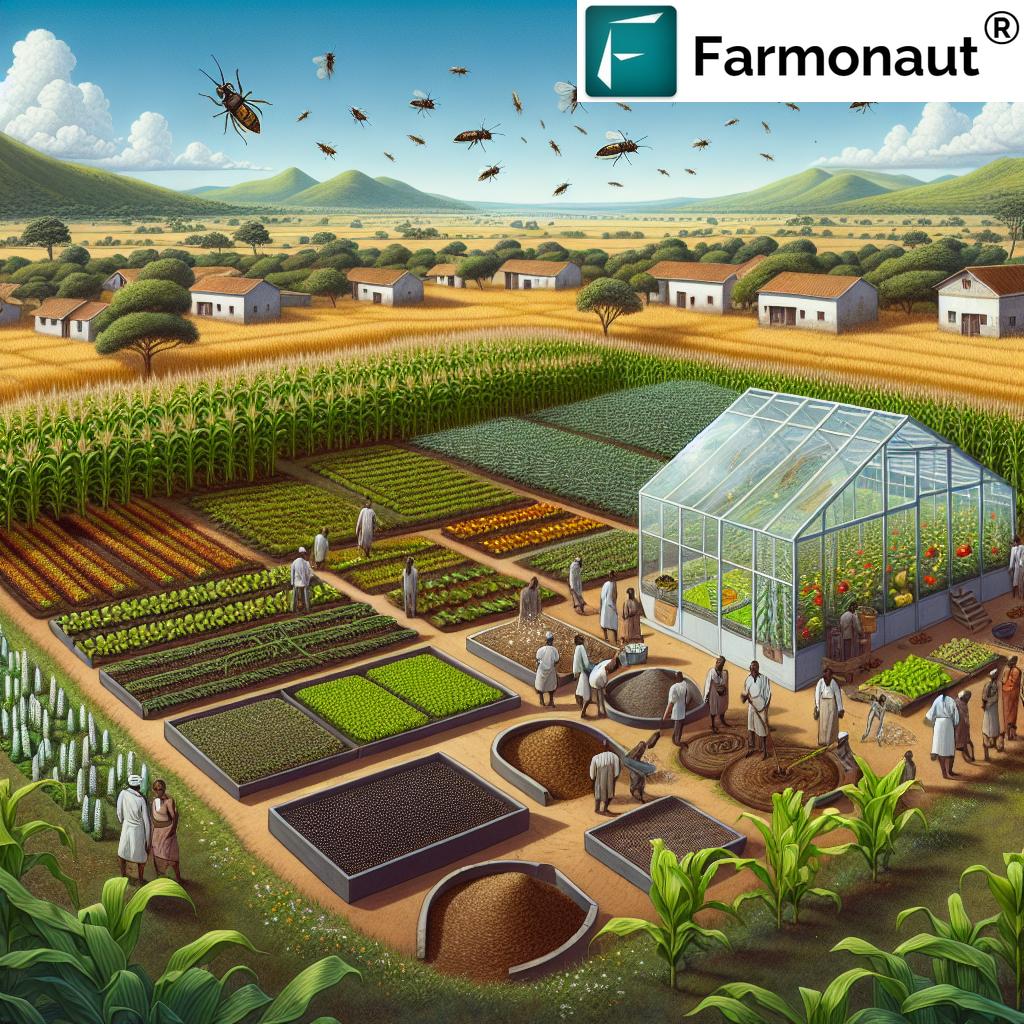Table of Contents
- Introduction
- Quick Kenya Forest Trivia
- What is Deforestation? Why Does It Matter for Agriculture?
- 7 Shocking Effects of Deforestation on Kenyan Agriculture
- Comparative Impact Table: Effects of Deforestation in Kenya
- Sustainable Agricultural Practices and Solutions
- How Farmonaut Empowers Sustainable Agriculture
- Frequently Asked Questions (FAQ)
- Conclusion
- Farmonaut Subscription Plans
Deforestation Effects: 7 Shocking Kenya Agriculture Impacts
Deforestation—the large-scale removal of forests—stands as one of the most urgent environmental threats facing agriculture in Kenya today. While the drive for agricultural expansion has often admired the short-term benefits of clearing land for farming, the ripple effects loom large. This approach, while providing more space for crops and intensive farming, can ultimately undermine the health, productivity, and sustainability of our ecosystems and food systems. In this article, we will unpack the profound effects of deforestation on agriculture, examining how forest removal impacts soil, climate, biodiversity, and the future of food production in Kenya. We’ll also explore smart, sustainable practices to reduce erosion, prevent biodiversity loss, and restore robust crop yields—all accentuated by the technology-driven insights Farmonaut delivers to the modern farmer.
If you’re committed to building a future where Kenyan agriculture thrives in harmony with nature, understanding the effects of deforestation on agriculture is an essential step. Let’s begin this journey towards sustainability and ecological resilience together.
What is Deforestation? Why Does It Matter for Agriculture?
Deforestation is the intentional clearing or removal of trees and the destruction of forests, often to create more arable land for agriculture, urban development, or resource extraction. In Kenya, widespread loss of forest cover has become a major concern, especially as it relates to food security and ecological health.
- Forests cover just 6% of Kenya’s land area, but they are critical “water towers” for rivers and the millions who rely on them.
- These woodlands are biodiversity hotspots, sheltering essential plants, animals, and microbes that sustain the soil and natural nutrient cycling.
When forests are cleared, we risk losing far more than trees. We threaten the intricate water cycles, soil fertility, and climate stability that underpin successful farming and sustainable rural livelihoods. Understanding the effects of deforestation on agriculture is pivotal for everyone dedicated to a secure food future and enduring land productivity in Kenya.
7 Shocking Effects of Deforestation on Agriculture in Kenya
Let’s explore how the removal of forests is triggering a cascade of environmental and economic consequences for Kenya’s farmers.
“Deforestation in Kenya has caused a 12% decline in agricultural biodiversity, threatening food security and ecosystem stability.”
1. Soil Erosion and Degradation — The Foundation of Crop Failure
When forests are removed, their root systems—the glue of the land—vanish. The result? Loose, exposed soil is battered by wind and rain, accelerating erosion. In fact, Kenya’s arable lands experience up to a 40% increase in soil erosion per decade, where forest cover declines rapidly. These soil erosion and degradation processes strip away the nutrient-rich topsoil essential for robust crop growth. As a result, fields become less productive, and farmers may be forced to abandon their lands when the costs of restoring soil fertility become too high.
- Loss of organic matter reduces water retention and structure, harming both food crops and grazing systems.
- Studies have shown that natural forests help reduce erosion and maintain healthy soil cycling dynamics necessary for agriculture.
According to research from Nigeria and East Africa, unchecked soil erosion due to deforestation is one of the primary factors leading to long-term soil degradation and declining crop productivity.
2. Loss of Soil Fertility — Less Nutrition, Lower Yields
Forests provide perpetual nourishment to the soil through their leaf litter and decomposing organic matter. When these cycles are interrupted by deforestation, the natural nutrient cycling that sustains agricultural productivity halts. Scientists have shown that when forests are cleared and converted to fields, soil organic carbon may decrease by as much as 48%. This sharp loss in fertility lowers yields, weakens crop health, and increases farmers’ reliance on chemical fertilizers, which can further degrade soil and disrupt ecosystems.
- Reduced soil organic matter limits the soil’s ability to retain water and nutrients.
- Loss of microbial diversity impedes cycling of key nutrients such as nitrogen and phosphorus.
- High yields become unsustainable without heavy intervention.
Farmonaut’s Carbon Footprinting tool empowers farmers and agribusinesses to monitor and reduce their emissions, strengthening the soil and complying with global sustainability targets.
3. Alteration of Water Cycles — Less Rainfall and More Flooding
Healthy forests act as vast water cycle regulators. Through root uptake, surface cover, and transpiration, they absorb rainfall, recharge groundwater, and contribute to precipitation. When they’re cleared or degraded, the entire rainfall and transpiration dynamic is thrown off balance.
- Deforestation in Kenya’s highland “water towers” has led to increasingly altered water cycles—droughts, reduced river flow, and catastrophic flooding in lowlands.
- Loss of forest cover boosts surface runoff, erodes topsoil, and shrinks natural aquifers, making water resources unreliable for agricultural use.
This cycle jeopardizes consistent crop production and exposes farming communities to both water scarcity and destructive storms.
Farmonaut’s Fleet and Resource Management tools help optimize water and machinery usage in vulnerable areas, supporting efficient agricultural practices and reducing waste even during erratic weather cycles.
4. Deforestation and Climate Change — Kenya’s Farming Future at Risk
Forests are vital carbon sinks. The clearing or burning of trees not only ceases ongoing carbon sequestration but also releases locked carbon into the air. In Kenya, this is a significant driver of climate change, which in turn disrupts crop growing seasons, escalates weather extremes like droughts and flooding, and introduces unpredictable pest and disease outbreaks.
- Deforestation is estimated to account for about 7% of global greenhouse gas emissions, and Kenya is acutely vulnerable to climate-driven food insecurity.
- Changing weather patterns can delay planting, decrease yields, and make harvests more susceptible to total failure.
Farmonaut’s Carbon Footprinting solutions allow farmers and agribusiness leaders to track their emission profiles and transition to truly sustainable agriculture.
5. Biodiversity Loss in Forests — Silent Crisis for Agriculture
Kenya’s forests are cradles of biodiversity—the living library of species that underpin essential ecosystem services like pollination, pest control, and nutrient cycling. Forest clearing removes habitats and endangers numerous beneficial organisms.
- A 12% decline in agricultural biodiversity has been linked to recent deforestation in Kenya, jeopardizing food security and ecosystem stability.
- Loss of wild pollinators and pest-predator species reduces yields for vital crops like coffee, fruits, and vegetables.
- Genetic diversity in wild relatives of crops is essential for breeding climate-resilient varieties.
Farmonaut’s Product Traceability platform helps agribusinesses and food companies identify sustainable sourcing regions and protect biodiversity in their supply chains.
6. Increased Incidence of Pests and Diseases — New Threats Emerge
The removal of forests does more than expose land: it alters natural habitats, encouraging the proliferation of pests and diseases previously kept in check by predators and balanced ecosystems. In Kenya, deforestation has contributed to new outbreaks of both crop and human diseases.
- The warming of microclimates following forest loss creates ideal conditions for malaria-carrying mosquitoes—and new pests that can devastate staple crops.
- This chain reaction undermines farmer productivity by increasing crop failure rates and even threatening vital agricultural labor forces.
Explore Farmonaut’s Large-Scale Farm Management App—perfect for analyzing pest and disease hotspots in real time, enabling timely interventions and data-driven crop protection.
7. Economic Impacts: Short Gains, Lasting Losses
The temptation to clear forests for agriculture is driven by the need for more land, but the net effect is often negative for the entire sector. Once fertile soils are lost, water becomes unreliable, and yields plummet, making Kenyan farming less resilient and profitable in the long term.
- Net economic losses mount as more resources are diverted for fertilizers, water pumping, and crop insurance.
- Degraded land eventually becomes too costly to cultivate, driving rural instability and food insecurity.
- Communities bear the cost of increased floods, droughts, and loss of ecosystem benefits.
Farmonaut’s Crop Loan and Insurance Verification tools help farmers and financial providers reduce risk by using real, satellite-based data for reliable lending and insurance premiums—encouraging smarter, sustainable investment in agriculture.
Comparative Impact Table: Effects of Deforestation in Kenya
The table below summarizes the seven most significant impacts of deforestation on Kenyan agriculture, highlighting both the estimated magnitude and practical sustainable practices to address each challenge.
| Effect | Estimated Impact in Kenya | Consequences on Agriculture | Suggested Sustainable Practice |
|---|---|---|---|
| Soil erosion and degradation | Up to 40% increase per decade where forest cover is lost | Loss of fertile soil, reduced crop productivity, increased land abandonment | Agroforestry, cover cropping, reduced tillage |
| Loss of soil fertility | Up to 48% drop in soil organic carbon upon forest conversion | Lower yields, increased need for fertilizers, weakened crops | Organic matter recycling, composting, integrated nutrient management |
| Decreased rainfall | Over 20% reduction in some highland regions | Drought stress, unreliable crop seasons, water scarcity | Watershed restoration, rainwater harvesting, forest buffers |
| Yield decline | Up to 30% drop in annual food harvests | Food insecurity, reduced farmer incomes, rural outmigration | Diversification, soil restoration, climate-smart crop selection |
| Pest increase | Increased outbreaks of crop pests and disease vectors | Crop loss, further decrease in yields, rising input costs | Biological control, pest monitoring (e.g., via Farmonaut), habitat conservation |
| Water scarcity | Depleted rivers and aquifers recorded in key regions | Limited irrigation, crop failure, livestock losses | Forest restoration, efficient irrigation, resource management tools |
| Climate warming | Mean temperature rise of up to 2°C in deforested zones | Disrupted seasons, new pests, heat/drought stressed crops | Reforestation, embracing carbon footprint monitoring, climate-resilient farming |
Sustainable Agricultural Practices: Reducing Deforestation Impacts
The good news? There are proven, sustainable agricultural practices that can make Kenya’s fields productive once again—without sacrificing the integrity of our remaining forests. Adopting these strategies allows us to reduce soil erosion, build biodiversity, and strengthen our resilience to climate change:
- Agroforestry Benefits: Planting trees alongside crops (“agroforestry”) enriches soil, stabilizes land, restores rainfall patterns, and boosts biodiversity—a win for both yields and resilience.
- Organic Matter Recycling: Retain leaves, stems, and natural residues to improve soil fertility and carbon content.
- Watershed Restoration: Safeguard and replant critical forest slopes and river margins to secure water supplies for all seasons.
- Efficient, Data-Driven Resource Management: Pair smart irrigation, fertilizer application, and timely pest detection with real-time insights.
- Crop Diversification: Integrate a broader range of drought-tolerant and pest-resistant crops to reduce risk and stabilize food supplies in uncertain climates.
Let us remember: sustainable is not just a buzzword—it’s the only future for thriving food systems in Kenya.
With the Farmonaut platform, farmers of all sizes can apply these best practices using affordable, easy-to-access technology.
API Developer Docs — Start building sustainable tools for climate-smart agriculture.
How Farmonaut Empowers Sustainable Agriculture in Kenya
At Farmonaut, our mission is directly aligned with safeguarding soils, crops, and the climate for a new era of resilient agriculture. Our satellite-based farm management platform and advanced data drive smarter agricultural decisions, enabling:
- Real-time crop health monitoring:
Track stress, drought, diseases, and vegetation vigor over whole farms to prevent loss before it happens. Our NDVI and multispectral mapping means smarter irrigation, fertilization, and land stewardship—every season, every crop. - Precision resource use:
Cut input costs, avoid over-fertilization, and protect ecosystems by aligning decisions with live soil health and weather data. - AI-powered advisory support (Jeevn AI System):
Personalized recommendations deliver real, actionable management advice, increasing yields while prioritizing sustainability and climate adaptation. - Blockchain traceability:
Certify your farm’s sustainable practices and connect with responsible buyers using trusted product journey mapping. - Carbon and resource footprinting for farm operations:
Meet both local and export market requirements on emissions, and future-proof your agribusiness. - Large-scale and smallholder solutions for all:
From small to large farmlands, Farmonaut ensures that advanced, data-driven sustainability is affordable, scalable, and accessible anywhere in Kenya or globally.
Discover all these features in the Farmonaut App—available on Android, iOS, and Web.
Farmonaut Subscription Plans
Make precision agriculture and climate-smart farming affordable—choose the right Farmonaut subscription for your needs.
Frequently Asked Questions (FAQ)
What are the major effects of deforestation on agriculture in Kenya?
The principal effects of deforestation on agriculture in Kenya include soil erosion and degradation, loss of soil fertility, altered water cycles, climate change acceleration, biodiversity loss, increased incidences of pests and diseases, and negative economic impacts—all of which undermine the productivity and sustainability of farming.
How does deforestation cause soil erosion?
Removing forests exposes soil to wind and rain, leading to faster erosion. Without trees, roots no longer anchor the soil. Over time, this strips farmland of its most fertile top layer and significantly reduces its capacity to grow healthy crops.
Why is biodiversity loss a concern for Kenyan farming?
Biodiversity loss in forests reduces the availability of beneficial insects for pollination and pest control, as well as diminishes the pool of resilient, native crop varieties. This weakens farm ecosystems and can lead to higher dependency on chemical inputs, raising costs and putting long-term yields at risk.
What are sustainable ways to protect Kenyan farms from deforestation impacts?
Sustainable agricultural practices such as agroforestry, recycling organic matter, minimizing tillage, restoring natural water cycles, crop diversification, and leveraging precision agriculture technologies are highly effective in reversing and preventing the most damaging effects of deforestation.
How can Farmonaut help Kenyan farmers address these challenges?
Farmonaut provides affordable access to satellite-driven crop health, soil moisture analytics, pest and disease monitoring, and carbon tracking—helping farmers make smarter, eco-friendly decisions that sustain yields, protect resources, and support sustainable agriculture at scale.
Is Farmonaut only for large agribusinesses?
Not at all. Farmonaut empowers everyone—from smallholder farmers to large enterprises—with scalable, subscription-based tools friendly to every budget and accessible on both web and mobile devices.
Conclusion: Toward a Sustainable Agricultural Future in Kenya
The effects of deforestation on agriculture in Kenya are vast, complex, and far-reaching. While agricultural expansion has provided opportunities, unsustainable forest removal threatens soil health, food security, climate stability, and rural prosperity. Embracing sustainable agricultural practices—including agroforestry, organic matter conservation, and precision technology—is not only beneficial but necessary for the next generation of Kenyan farmers.
By leveraging advanced, cost-effective technologies such as Farmonaut’s real-time monitoring and AI-driven advisory systems, we can restore land health, improve resilience, and guarantee thriving yields for years to come—all while protecting Kenya’s priceless natural heritage.
Let us act together: for the land, the climate, the farmer, and our shared future.

















